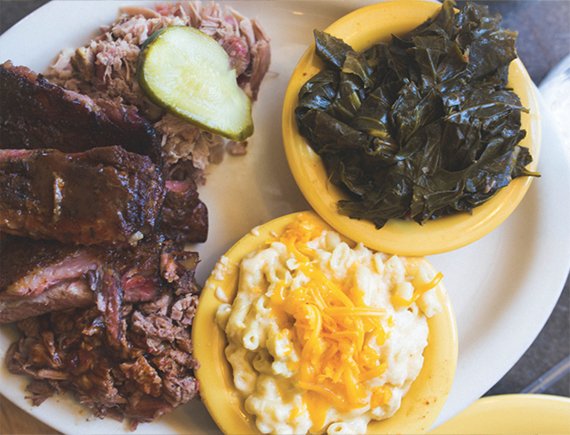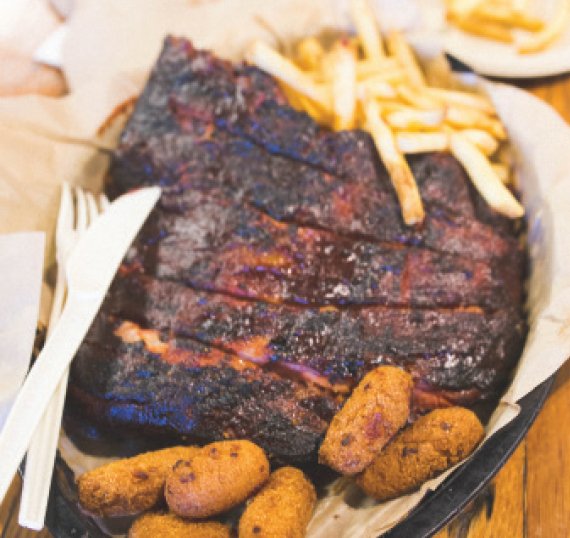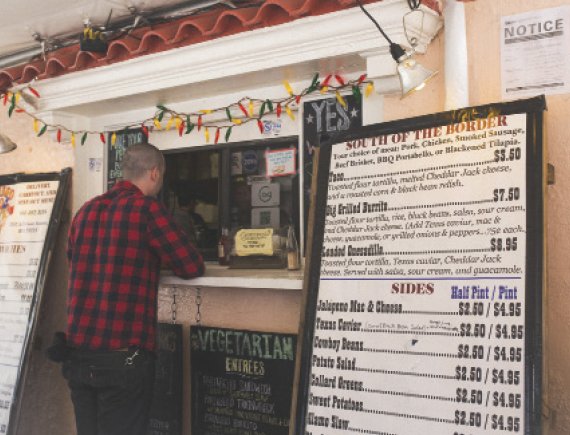
Dixie Bones BBQ
In Search of Virginia Barbecue
Is it all in the sauce?
Photos and text BY ANN HSU KAUFMAN
Barbecue in Virginia must have a self-esteem problem or, at the very least, an identity crisis.
Well-known smokers all over the state pump out tender, fall-off-the-bone meats. But instead of adopting its own unique cooking style, spice rub, sauce or blend, many Virginia-based establishments dress up their meats in sauces with roots in more well-known barbecue regions.
Even though some purists argue the best barbecue should stand on its own, it’s undeniable smothering a good sauce, like the sweet red from Kansas City, the bite of vinegar from North Carolina or the sunshine-bright mustard of South Carolina, boosts the flavor of well-cooked meat. Sauces become identifying mantras of regional barbecue.
Offering more than one sauce from regions across the country seems to be the norm in Northern Virginia’s barbecue scene.
At Dixie Bones BBQ in Woodbridge, four sauces—a traditional tomato, a mild tomato with a thinner consistency, a vinegar and a creamy Alabama white sauce—crowd each table.
Rocklands Barbeque and Grilling Co., with multiple locations, uses a crock pot to warm a thick tomato-based sauce, sitting next to a smattering of other bottled barbecue and hot sauces. It’s hard to tell in the noise of so many sauces whether there’s a true Virginia-style barbecue buried somewhere underneath.
“Virginia barbecue came about the same way as Virginia smoked ham did in the early 19th century,” says Joe Haynes, who is writing a book about the history of Virginia barbecue. Yet unlike Virginia smoked country hams, proudly labeled and marketed, the roots of genuine Virginia barbecue seem to have faded.
Haynes, who visited numerous barbecue joints in Virginia, narrowed down what he calls genuine Virginia barbecue sauces to two specific characteristics. The color can be red, a tomato or ketchup base, or brown, thanks to Worcestershire sauce. Consistency can lean either thick or thin, with thicker sauces tending to rely more heavily on tomato paste and thinner sauces generally having more vinegar. This might be an overly vague definition of Virginia barbecue, but it also seems to be true.
 Buz & Ned’s
Buz & Ned’s
The search for the state’s sauce started at Buz and Ned’s Real Barbecue in Richmond and Pierce’s Pitt Bar-B-Que in Williamsburg, establishments considered to be among the best in the state.
Both places offer smoked pork—Buz and Ned’s has a strong hickory flavor permeating the meat, while Pierce’s is a softer blend of both hickory and oak—and the sauces from both joints are tomato-based with a sweet tang, though Pierce’s is slightly thinner than Buz and Ned’s. A variant of this tangy tomato sauce showed up at nearly every barbecue joint investigated for this story, yet no restaurant specifically labeled its sauce as authentically Virginian.
“Our barbecue sauce is a hybrid,” says owner Buz Grossberg, 62. “I wanted something that, even if it wasn’t the taste my customers had grown up with, it was just as satisfying so that they would say: ‘It’s not the sauce from back home, but you know what? It’s pretty good.’”
His barbecue sauce contains tomato paste, mustard and vinegar, the foundational ingredients in the sauces of Kansas City, South Carolina and North Carolina. Still, when pressed to identify which parts of his barbecue were distinctly Virginian, Grossberg demurred. “Virginia barbecue doesn’t really have a taste or process that we can call our own,” he says. “We borrow and we make hybrids of other regional flavors.”
Andrea Hutchins, 72, director of operations at Pierce’s Pitt, agrees. “You can’t necessarily put a finger on what Virginia barbecue is.”
Calling Pierce’s Pitt’s barbecue distinctive, she points to the open pits just outside the restaurant, where Boston butt cuts of pork are smoked every day, and the restaurant’s sauce, which was derived from a tomato-based sauce made by owner Jay Pierce’s grandmother from Alabama and tweaked over the years.
Other Virginia barbecue joints steer away from the choose-your-own-adventure array of sauces, pointedly identifying with barbecue from elsewhere.
 Alamo BBQ
Alamo BBQ
Alamo BBQ in Richmond, for example, claims to be “a little bit of Texas in Virginia,” while serving up meltingly tender baby back pork ribs slathered with a tangy red sauce that seems common to the Virginia barbecue restaurants. The ribs are meaty and the addictive sauce is a glassy red, viscous and tangy. If there’s any element of Virginia at Alamo BBQ, it’s in the sauce, which is similar in flavor profile to the tangy tomato sauces at Buz and Ned’s and Pierce’s Pitt.
Even restaurants making genuine Virginia barbecue might not be fully aware of what ties their barbecue to the state’s origins. Early versions of Virginia barbecue, according to Haynes, were tangy and spiced with sweet herbs, including oregano, thyme, cumin and nutmeg. These spices were used because they were grown locally, along with ketchup made of mushrooms.
“As Virginians gradually became able to afford to purchase luxuries such as vinegar and cayenne pepper, the definition of Virginia barbecue began to loosen, and gradually it diversified as other states developed distinct flavor profiles,” Haynes says.
Haynes points to Hillbilly Red’s BBQ in Sandston, just outside Richmond, as an example of genuine Virginia barbecue. Owner Mark “Red” Thomas smokes roughly 500 pounds of dry-rubbed Boston butt pork for 11 hours over hickory wood. His house sauce, a pasty blend of ketchup, spices, vinegar and pepper, is what Haynes calls the real McCoy of Virginia barbecue sauces.
“My barbecue has just the right amount of wood smoke that you can eat with a lot of sauce,” Thomas says. Still, he doesn’t call his barbecue Virginian.
When he opened Hillbilly Red’s nine years ago, Thomas learned how to make barbecue from reading books and watching television. The house sauce was the result of Thomas’ dedication to great-tasting ’cue but not necessarily in the quest to make truly Virginian barbecue.
And maybe that’s just it.
Virginia barbecue might be hidden somewhere among the sticky array of copycat sauces lined up on tables all over the state, but that doesn’t make it any less interesting or flavorful. Like the search for the Holy Grail, looking for a singularly Virginian style is a journey worth taking, even if a concrete definition is just out of reach.
Get it: Alamo BBQ 2202 Jefferson Ave., Richmond Buz and Ned’s 1119 North Blvd., Richmond and 8205 W. Broad St., Richmond Dixie Bones 13440 Occoquan Road, Woodbridge and 1917 Plank Road, Fredericksburg Hillbilly Red’s BBQ 353 E. Williamsburg Road, Sandston Pierce’s Pitt 447 E. Rochambeau Drive, Williamsburg Rocklands 25 S. Quaker Lane, Alexandria and 3471 Washington Blvd., Arlington
(July 2015)
